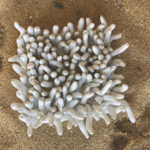Rob DuToit is teaching an online art history course on Tuesday, January 26th, at 10 a.m. to noon via Truro Center for the Arts at Castle Hill. The topic: landscape painting from ancient times through impressionism. Registration is pay-what-you-can at castlehill.org. Also on Tuesday, January 26th, Catherine McCarthy leads “Keeping the Flow,” a monthly crit group for visual artists. The group meets virtually on the last Tuesday of each month, 4 to 5:30 p.m. Registration is $450.
Truro Center for the Arts at Castle Hill
Spaghetti Junction
Join Chef Michael Ceraldi for a pasta making class, via Zoom, hosted by Truro Center for the Arts at Castle Hill. It will take place Thursday, January 14th, from 5 to 7 p.m. Recipes include amatriciana and cacio e pepe. Registration is $65 at castlehill.org.
Grab a Chair
“Shake off mid-winter doldrums by indulging your inner wordsmith,” writes Kate Wallace Rogers in the course description for her online poetry class at Truro Center for the Arts at Castle Hill. It takes place Mondays and Thursdays, beginning January 11th, at 10 a.m. to noon. Registration is $285 at castlehill.org. Also at Castle Hill: The “Yellow Chair Salon,” a three-month virtual residency program with Michael David, begins Thursday, January 11th. It features workshops and presentations with such guest artists as Peter Bonner, Paul D’Agostino, Deborah Dancy, David Cohen, Daniel John Gadd, Brenda Goodman, Joan Snyder, Kara Rooney, and Jen Samet. Days and times will be worked out with students. Registration is $675.
Wax Poetic
Dorothy Cochran is teaching an online course on encaustic monotypes at Truro Center for the Arts at Castle Hill. “Students will learn about heat sources, encaustic wax, transparency, tools, papers, and water-based materials that can be used in tandem with the monotype,” according to the course description. There are four Thursday sessions, 10:30 a.m. to 12:30 p.m., beginning January 7th. Registration is $300 at castlehill.org.
Wax Poetic
Dorothy Cochran is teaching an online course on encaustic monotypes at Truro Center for the Arts at Castle Hill. “Students will learn about heat sources, encaustic wax, transparency, tools, papers, and water-based materials that can be used in tandem with the monotype,” according to the course description. There are four Thursday sessions, 10:30 a.m. to 12:30 p.m., beginning January 7th. Registration is $300 at castlehill.org.
Pot Shop
Paul Wisotzky is teaching a virtual course, “Studio Pottery: Pots and Process,” via Truro Center for the Arts at Castle Hill on Wednesdays, beginning January 6th, from 1 to 3 p.m. Registration is $300 at castlehill.org. In addition to the weekly Zoom sessions, the course includes one-on-one coaching with Wisotzky, as well as open studio time for an additional fee.
Spin a Yarn
Dahlia Popovits is teaching a weaving workshop at Truro Center for the Arts at Castle Hill, 10 Meetinghouse Road, on Monday, December 14th, at 10 a.m. to 4 p.m. Registration is $150, plus $25 for materials, at castlehill.org.
Small Wonders
Truro Center for the Arts at Castle Hill is offering a “Virtual Small Works Show,” on display through December 11th at castlehill.org. If you prefer your art live, the Provincetown Art Association and Museum, at 460 Commercial St., is showing “Members’ Open: Small Works,” with hundreds of pieces on view and for sale, through January 10th. PAAM is open by appointment only (at paam.org/tickets/), in one-hour slots from 11 a.m. to 5 p.m., Wednesday through Sunday. Admission is $12.50, free for members and under 16. This event is ongoing.
Reinvent the Wheel
Paul Wisotzky is teaching an online workshop, “Studio Pottery: Pots and Process,” at Truro Center for the Arts at Castle Hill on Wednesdays starting November 25th, at 1 p.m. Four weekly sessions cost $185 at castlehill.org.
Reinvent the Wheel
Paul Wisotzky is teaching an online workshop, “Studio Pottery: Pots and Process,” at Truro Center for the Arts at Castle Hill on Wednesdays starting November 25th, at 1 p.m. Four weekly sessions cost $185 at castlehill.org.
INTO THE WOODS
Rich Blundell Connects the Cosmos to Art on Cape Cod
The Castle Hill resident explores the natural history of surfboards
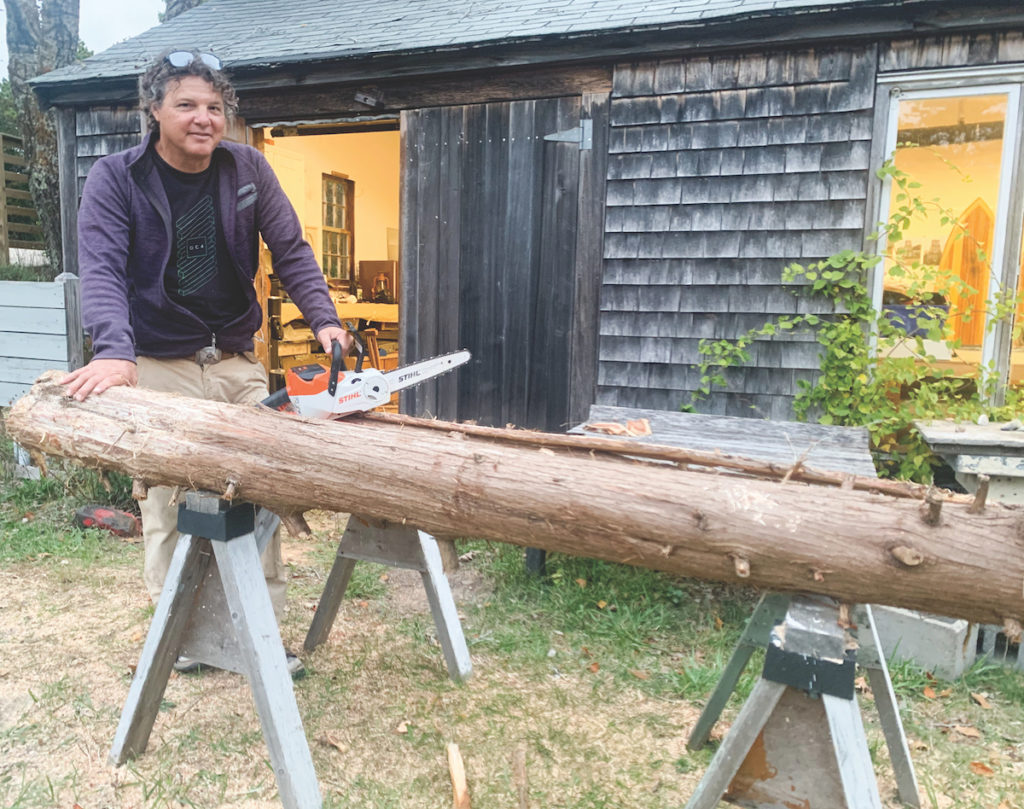
“Everything I do, I do because I love nature, because I want to be connected to nature. That guides every decision in my life,” says Rich Blundell. He has come to the Truro Center for the Arts at Castle Hill to work on his handmade wooden surfboard sculptures, using local cedar wood. It’s part of a journey he’s making to introduce artists to the principles of “ecological intelligence.”
Blundell’s deep connection to the Earth and the environment was born in the woods, sand, and waters of Cape Cod. Though he grew up across the bay, in Duxbury, he spent his childhood summers here, swimming and surfing in the ocean and exploring hidden paths between the ponds, pines, and cedars. After traveling the world to study and teach science — Blundell has a geology and biology degree, a master’s in the history and philosophy of science, and a Ph.D. in “big history,” a field that explores humanity’s relationship to the evolution of the cosmos — he chose this residency as a way of returning to the place he calls his natural home.
“I’m very connected to the diverse ecosystems here — the grit of this soil, the way pine needles dry, and the mixing of salt and fresh water,” he says. “There is something about the particular chemistry of this place that is unique.”
To Blundell, both art and surfing are ecstatic practices. As an artist, he creates two distinct types of surfboards: the first are meticulously crafted wooden boards intended for surfing, and are built using his own “retro-designs.” They are shaped differently and are heavier than modern high-performance boards, and they teach surfers to be attuned to the subtle cues of each wave as it moves from the horizon toward the shore. These functional surfboards “provide a special kind of living glide, and Cape Cod trees seem to glide best down Cape Cod waves,” he says. “There is just something spiritual that happens when local wood, water, and waves come together.”
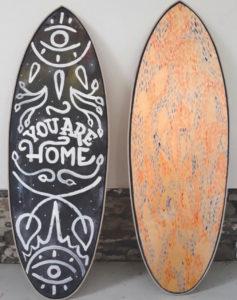
Blundell also makes simpler surfboards that are explicitly artworks — a canvas onto which he and, possibly, other artists in collaboration “manifest or express ecological intelligence.” The piece titled You Are Home, for example, was created in collaboration with Chelsea Arruda, who had taken one of the classes for artists in Blundell’s education program, Oika. Named after the Greek word oikos, meaning “house” or “home,” the root of the prefix “eco-,” Blundell’s program “aims to re-establish the link between economy and ecology” and a “feeling of belonging that can inspire creativity in artists.”
Blundell believes that artists often have a heightened sensitivity, even though they may not be aware of it, that uniquely positions them to bring an understanding of nature back into the culture. By teaching artists to recognize this, he feels they can achieve a shift in “the climate of our minds” that will save us from destroying the planet.
“Artists have forgotten that they are the essential meaning-makers,” Blundell says. “That’s what we need in order to heal the many intertwined traumas we are currently facing. If you look at the history of humans, our species is 150,000 to 300,000 years old, and for 99.9 percent of that time we lived in relationship with nature. But we have lost that connection, and now we’re starting to notice that we can’t live without it. It’s intrinsic to all human beings, because we emerge from nature — not just our bodies, but also our creative minds.” In other words, he says, “What artists do is simply an extension of nature’s creativity.”
Blundell is currently working on two projects in his studio on Castle Hill’s Edgewood Farm campus. One is a triptych of three surfboard sculptures that tells the history of the land here. “I’m focusing on the cedar tree and its different manifestations in this habitat,” he says. “Cedars are naturally stained with the minerals of glacial sediments, and the wood grain is guided by living with other trees.”
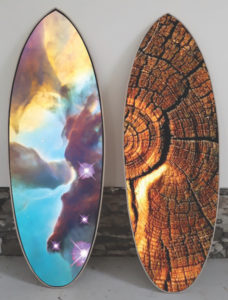
He points to pieces of wood covered in bark laid out in the shape of a surfboard. “This tree was growing here two days ago,” Blundell says. “Here it is, rough and raw. I’m going to make one surfboard out of this texture, and another using the same wood’s refined and finished texture showing its grain pattern. The third board panel is going to be covered in weathered barn shingles that tell the cultural part of this Cape Cod story.”
Blundell’s second project is based on a Cosmic Duo of surfboards, which explores “how celestial ecologies impinge on the familiar biological ecologies here on Earth.” He says that “not many people know, much less feel, how cosmic-scale events such as colliding galaxies and the supernovae they trigger, or the convergences of neutron stars 144 million light years away, lead to the creation of the atoms in trees and our own bodies. About one tenth of a gram of each human being is made of neutrons that escaped annihilation in a black hole by surfing on gravitational waves to get here. That reality puts current politics into a different perspective.”
Wax Enthusiastic
Susan Stover is teaching “East Meets West: Batik + Encaustic,” a four-session virtual course from Truro Center for the Arts at Castle Hill on Mondays and Thursdays, starting Monday, November 9th, from 1 to 3 p.m. Registration is $300 at castlehill.org.
MIXED MEDIA
Eco-inspired Artist Jamie Levine Was Hit Hard by Covid
Now a resident at Castle Hill in Truro, she’s reconnecting with nature
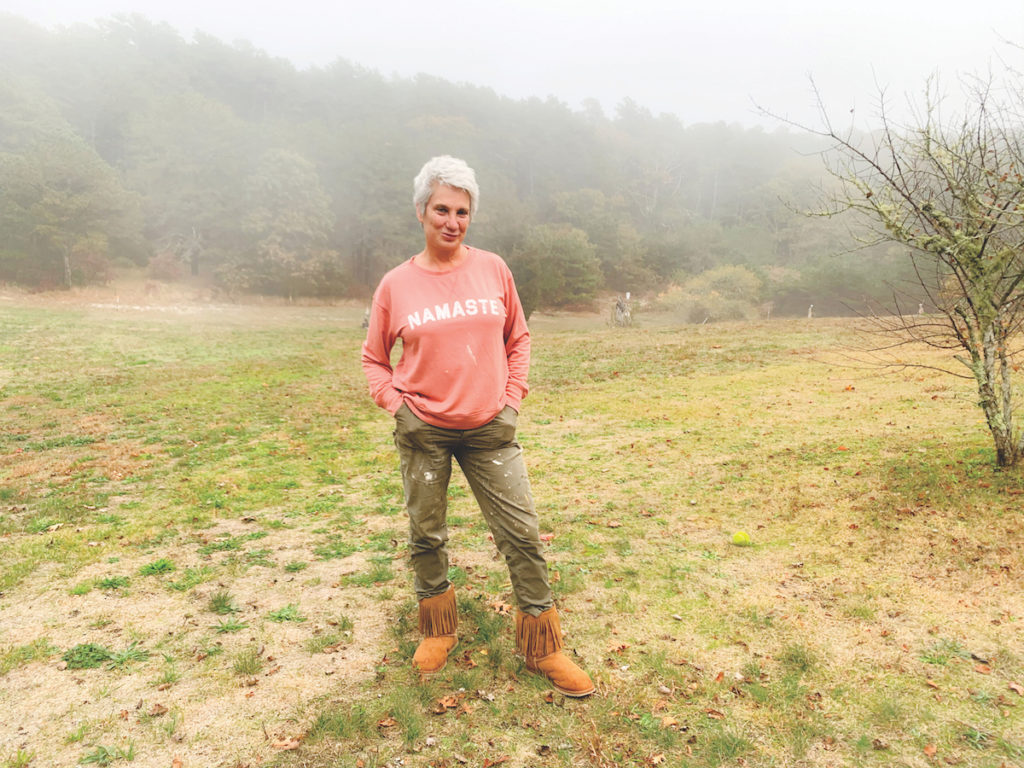
“I came to Truro to create cremation urns,” says sculptor Jamie Lehrhoff Levine, one of five resident artists who recently arrived at Truro Center for the Arts at Castle Hill. Back home in New Jersey, Levine was immersed in a project to craft personalized urns for the living, a reaction to the pandemic. Her first urn was an eagle, adorned with feathers, beak, and eyes, which she made for her husband, Gil, and pointedly titled Just in Case.
“Thinking about death is scary,” Levine says. “How do you make it digestible? I use humor as a coping mechanism. You think you’re going to die? Well, now we’re prepared!”
Once she got comfortable at Castle Hill, however, Levine’s plans changed, and it’s not the first time her residency has taken an unexpected turn.
She had originally driven to Truro on March 8, planning to spend a month creating art inspired by nature to address environmental concerns. Death and cremation urns were the farthest thing from her mind. While still on the road, she received a phone call: her residency had been canceled due to Covid-19, and the world was going into lockdown.
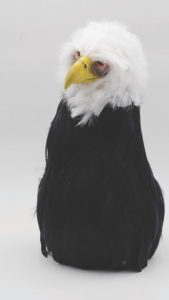
Turning back toward New Jersey, disappointed and frightened, Levine found a slim silver lining in having a carload of art supplies to take into isolation. At home, however, she was surrounded by news of the pandemic, and her art took a dark turn.
“I was working in black-and-white paintings, a complete departure from my usual style,” she says. “They were extremely immediate, and I worked fast because I was so anxious.” One of Levine’s paintings from this time, Free Fall, shows the artist floating naked and undernourished in a fetal position. “I was starving for socialization and communication,” she says, “and I felt unprotected and unable to protect those I love.”
It was out of this mood and the need to find some relief in levity that Levine turned to the urn project. But when she finally arrived at Castle Hill this month to restart her postponed month-long residency, her emotions shifted yet again. “I felt immediately safe,” she says. “I went to the ocean on my first day here and looked at the vastness. That’s when I realized that there is a bigger picture than what is happening around me, and I found myself emerging out of my darkness. My new work is about what it means to be living.”
From an early age, Levine’s immediate surroundings have had a strong impact on her art, both in subject matter and choice of materials. She describes her process as “response work,” adding, “I am constantly letting my environment guide me and speak to me.”
The daughter of a divorced, hard-working mother, Levine spent her childhood exploring nearby conservation land with her best friend, Bonnie Blafer Schweinler, who also became an artist. “We both saw the world in a different way,” Levine says, “but we were in tune with nature.” Not having many toys to play with, Levine created art using whatever materials she could find — and still does. “I explore all materials, and I use them in a way that best speaks to what I’m trying to communicate,” she says.
After studying industrial and textile design at Syracuse University, she ended up working in real estate, then returned to school in her early 50s to get an M.F.A. at Montclair State University in New Jersey. Inspired during her studies by the image of the Chimera from Greek myth — it has a lion’s head, goat’s body, and serpent’s tail — Levine began to explore the idea of bio-engineered creatures composed of cells from two or more genetically different beings.
The image of a genetically mutated, featherless chicken that had been bred for fast growth and inexpensive processing incited Levine to create her installation piece Come Play With Me, merging raw chicken parts bought in a supermarket with a plastic baby doll. “The image of that bald chicken was horrific,” she says. “I couldn’t let it go, so I created a chicken baby on a swing, sitting precariously, not holding on. Is it going to fall? Is it going to fly? It’s that extreme fragility and vulnerability that I was attempting to express.”
Levine adds that creating Chimeras has taught her what it means to be fully human, “a goal towards which we must all aspire, rather than a static state of entitlement.”
At Castle Hill, no longer focusing on cremation urns, Levine has been working on pieces that come out of a conversation with nature — creatures of the ocean who exist and survive in community. “I am creating small worlds that engage with what it means to be alive,” she says. “The corals I am studying grow in clusters and inspire themes of family, togetherness, and community.” Levine’s creatures of the ocean are hybridized, taking parts from different beings to meld into new forms. “My work just happens that way,” she says.
Food for Thought
Truro Center for the Arts at Castle Hill is offering a virtual food-writing course with Kathy Gunst and Katherine Alford, authors of Rage Baking — The Transformative Power of Flour, Fury and Women’s Voices, on four Wednesdays starting November 4th, from 6:30 to 8:30 p.m. Registration is $285 at castlehill.org.
Food for Thought
Truro Center for the Arts at Castle Hill is offering a virtual food-writing course with Kathy Gunst and Katherine Alford, authors of Rage Baking — The Transformative Power of Flour, Fury and Women’s Voices, on four Wednesdays starting November 4th, from 6:30 to 8:30 p.m. Registration is $285 at castlehill.org.

